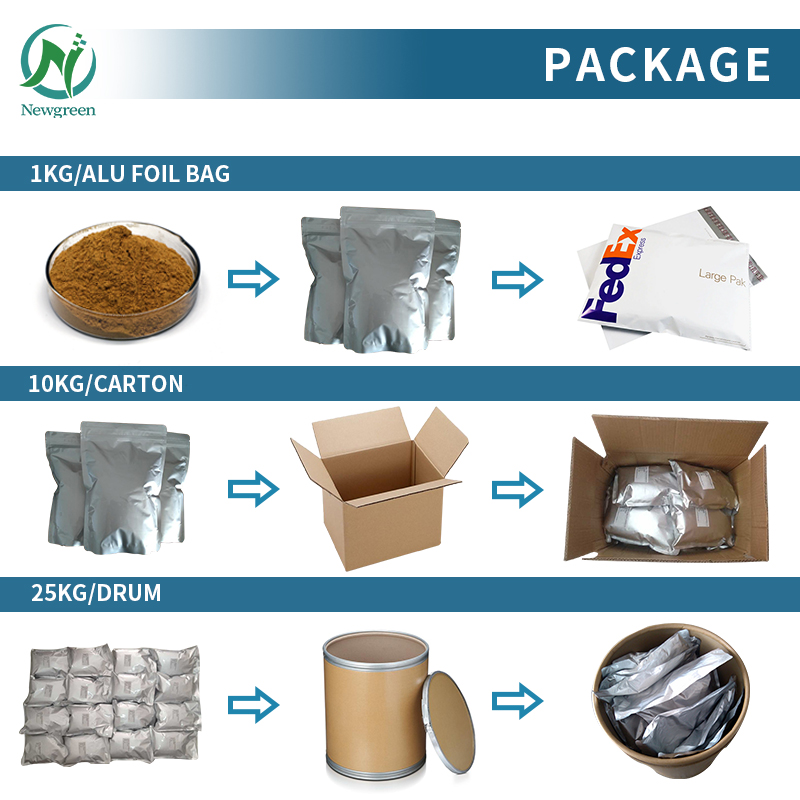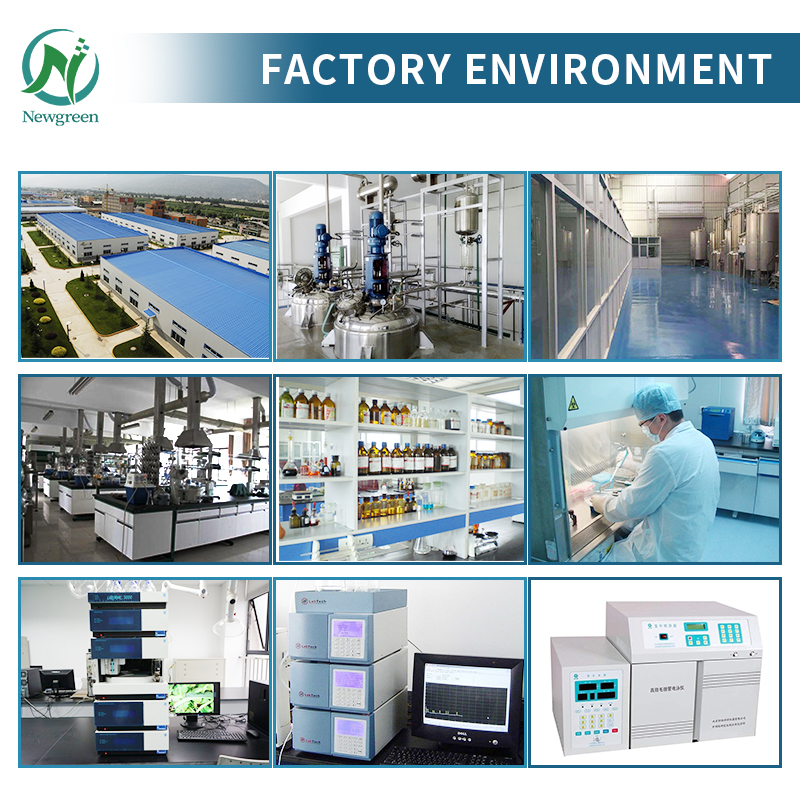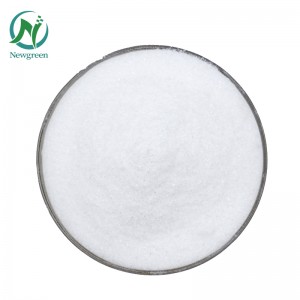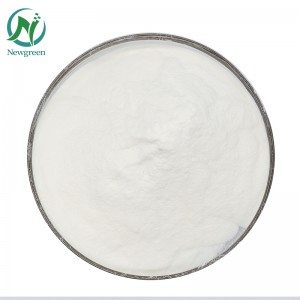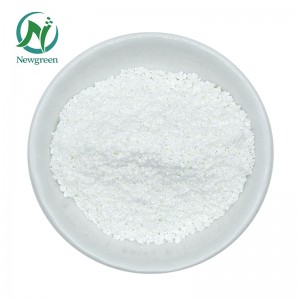Newgreen Supply Food/Feed Grade Probiotics Bacillus Subtilis Powder

Product Description
Bacillus subtilis is a species of Bacillus. A single cell is 0.7-0.8×2-3 microns and is evenly colored. It has no capsule, but has flagella around it and can move. It is a Gram-positive bacterium that can form endogenous resistant spores. The spores are 0.6-0.9×1.0-1.5 microns, elliptical to columnar, located in the center or slightly off the bacterial body. The bacterial body does not swell after spore formation. It grows and reproduces quickly, and the surface of the colony is rough and opaque, dirty white or slightly yellow. When growing in liquid culture medium, it often forms wrinkles. It is an aerobic bacterium.
Bacillus subtilis has a variety of effects, including promoting digestion, enhancing immunity, and having antibacterial effects. It is widely used in many fields, including food, feed, health products, agriculture and industry, demonstrating its important value in health and production efficiency.
COA
|
ITEMS |
SPECIFICATIONS |
RESULTS |
| Appearance | White or slightly yellow powder | Conforms |
| Moisture content | ≤ 7.0% | 3.52% |
| The total number of
living bacteria |
≥ 2.0x1010 cfu/g | 2.13x1010 cfu/g |
| Fineness | 100% through 0.60mm mesh
≤ 10% through 0.40mm mesh |
100% through
0.40mm |
| Other bacterium | ≤ 0.2% | Negative |
| Coliform group | MPN/g≤3.0 | Conforms |
| Note | Aspergilusniger: Bacillus Coagulans
Carrier: Isomalto-oligosaccharide |
|
| Conclusion | Complies with the Standard of requirement. | |
| Storage | Store in a well-closed place with constant low temperature and no direct sun light. | |
| Shelf life |
2 years when properly stored |
|
Funtion
1. Subtilis, polymyxin, nystatin, gramicidin and other active substances produced during the growth of Bacillus subtilis have obvious inhibitory effects on pathogenic bacteria or conditional pathogens of endogenous infection.
2. Bacillus subtilis rapidly consumes free oxygen in the intestine, causing intestinal hypoxia, promoting the growth of beneficial anaerobic bacteria, and indirectly inhibiting the growth of other pathogenic bacteria.
3. Bacillus subtilis can stimulate the growth and development of animal (human) immune organs, activate T and B lymphocytes, increase the levels of immunoglobulins and antibodies, enhance cellular immunity and humoral immunity, and improve group immunity.
4. Bacillus subtilis synthesizes enzymes such as α-amylase, protease, lipase, cellulase, etc., which work together with digestive enzymes in the animal (human) body in the digestive tract.
5. Bacillus subtilis can help synthesize vitamin B1, B2, B6, niacin and other B vitamins, and improve the activity of interferon and macrophages in animals (humans).
6. Bacillus subtilis promotes spore formation and microencapsulation of special bacteria. It has good stability in the spore state and can resist oxidation; it is resistant to extrusion; it is resistant to high temperature, can withstand high temperature of 60°C for a long time, and can survive for 20 minutes at 120°C; it is resistant to acid and alkali, can maintain activity in the acidic stomach environment, can withstand the attack of saliva and bile, and is a live bacteria among microorganisms that can reach the large and small intestines 100%.
Application
1. Aquaculture
Bacillus subtilis has a strong inhibitory effect on harmful microorganisms such as Vibrio, Escherichia coli and baculovirus in aquaculture. It can secrete a large amount of chitinase to decompose toxic and harmful substances in the aquaculture pond and purify the water quality. At the same time, it can decompose the residual bait, feces, organic matter, etc. in the pond, and has a strong effect of cleaning small garbage particles in the water. Bacillus subtilis is also widely used in feed. It has strong protease, lipase and amylase activities, which can promote the degradation of nutrients in feed and make aquatic animals absorb and utilize feed more fully.
Bacillus subtilis can reduce the occurrence of shrimp diseases, greatly increase shrimp production, thereby improving economic benefits, biological environmental protection, stimulate the development of aquatic animals' immune organs, and enhance the body's immunity; reduce the occurrence of shrimp diseases, significantly increase shrimp production, thereby improving economic benefits, purify water quality, no pollution, no residue.
2. Plant disease resistance
Bacillus subtilis successfully colonizes in the rhizosphere, body surface or body of plants, competes with pathogens for nutrients around the plants, secretes antimicrobial substances to inhibit the growth of pathogens, and induces the plant defense system to resist the invasion of pathogens, thereby achieving the purpose of biological control. Bacillus subtilis can mainly inhibit a variety of plant diseases caused by filamentous fungi and other plant pathogens. The Bacillus subtilis strains isolated and screened from the rhizosphere soil, root surface, plants and leaves of crops reportedly have antagonistic effects on many fungal and bacterial diseases of different crops. For example, rice sheath blight, rice blast, wheat sheath blight, and bean root rot in grain crops. Tomato leaf disease, wilt, cucumber wilt, downy mildew, eggplant gray mold and powdery mildew, pepper blight, etc. Bacillus subtilis can also control a variety of post-harvest fruit diseases such as apple rot, citrus penicillium, nectarine brown rot, strawberry gray mold and powdery mildew, banana wilt, crown rot, anthracnose, apple pear penicillium, black spot, canker, and golden pear fruit rot. In addition, Bacillus subtilis has a good preventive and control effect on poplar canker, rot, tree black spot and anthracnose, tea ring spot, tobacco anthracnose, black shank, brown star pathogen, root rot, cotton damping-off and wilt.
3. Animal feed production
Bacillus subtilis is a probiotic strain commonly added to animal feed. It is added to animal feed in the form of spores. Spores are living cells in a dormant state that can tolerate the adverse environment during feed processing. After being prepared into a bacterial agent, it is stable and easy to store, and can quickly recover and reproduce after entering the animal intestine. After Bacillus subtilis is revived and proliferated in the intestines of animals, it can exert its probiotic properties, including improving the intestinal flora of animals, enhancing the body's immunity, and providing enzymes required by various animals. It can make up for the lack of endogenous enzymes in animals, promote the growth and development of animals, and has a significant probiotic effect.
4. Medical field
The various extracellular enzymes secreted by Bacillus subtilis have been applied to many different fields, among which lipase and serine fibrinolytic protease (i.e. nattokinase) are widely used in the pharmaceutical industry. Lipase has a variety of catalytic abilities. It works together with the existing digestive enzymes in the digestive tract of animals or humans to keep the digestive tract in a healthy balance. Nattokinase is a serine protease secreted by Bacillus subtilis natto. The enzyme has the functions of dissolving blood clots, improving blood circulation, softening blood vessels, and increasing blood vessel elasticity.
5. Water purification
Bacillus subtilis can be used as a microbial regulator to improve water quality, inhibit harmful microorganisms, and create an excellent aquatic ecological environment. Due to long-term high-density animal farming, aquaculture water bodies have a large amount of pollutants such as bait residues, animal remains and feces deposits, which can easily cause water quality deterioration and endanger the health of farmed animals, and even reduce production and cause losses, which is a huge threat to the sustainable development of aquaculture. Bacillus subtilis can colonize in water bodies and form dominant bacterial communities through nutrient competition or spatial site competition, inhibiting the growth and reproduction of harmful microorganisms such as harmful pathogens (such as Vibrio and Escherichia coli) in water bodies, thereby changing the number and structure of microorganisms in water bodies and sediments, and effectively preventing diseases caused by water quality deterioration in aquatic animals. At the same time, Bacillus subtilis is a strain that can secrete extracellular enzymes, and the various enzymes it secretes can effectively decompose organic matter in water bodies and improve water quality. For example, the active substances chitinase, protease and lipase produced by Bacillus subtilis can decompose organic matter in water bodies and degrade nutrients in animal feed, which not only enables animals to fully absorb and utilize nutrients in feed, but also greatly improves water quality; Bacillus subtilis can also adjust the pH value of aquaculture water bodies.
6. Others
Bacillus subtilis is also widely used in sewage treatment and biofertilizer fermentation or fermentation bed production. It is a multifunctional microorganism.
1)Municipal and industrial sewage treatment, industrial circulating water treatment, septic tank, septic tank and other treatments, animal waste and odor treatment, feces treatment system, garbage, manure pit, manure pool and other treatments;
2)Animal husbandry, poultry, special animals and pet breeding;
3)It can be mixed with a variety of strains and plays an important role in agricultural production.
Package & Delivery
